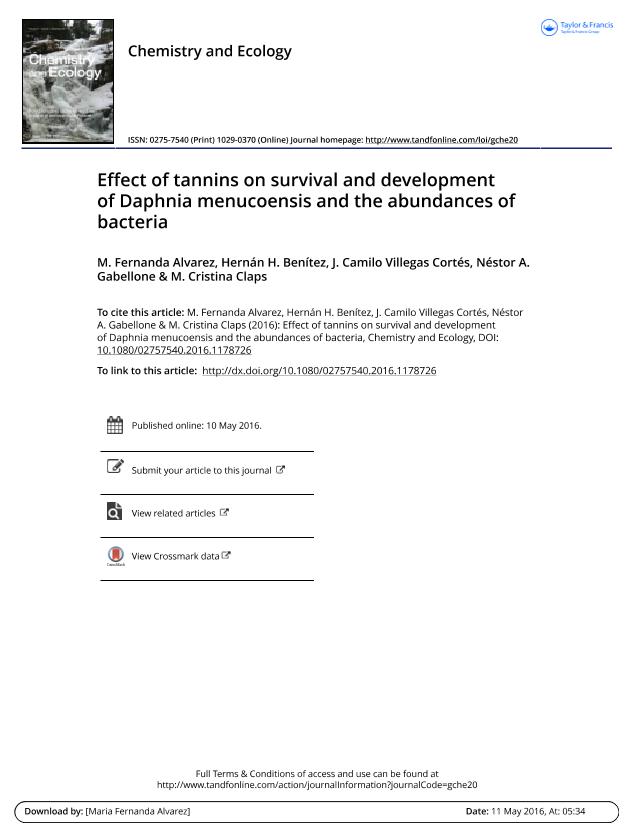Artículo
Effect of tannins on survival and development of Daphnia menucoensis and the abundances of bacteria
Alvarez, María Fernanda ; Benitez, Hernan Hugo
; Benitez, Hernan Hugo ; Villegas Cortés, J. Camilo; Gabellone, Nestor Adrian
; Villegas Cortés, J. Camilo; Gabellone, Nestor Adrian ; Claps, Maria Cristina
; Claps, Maria Cristina
 ; Benitez, Hernan Hugo
; Benitez, Hernan Hugo ; Villegas Cortés, J. Camilo; Gabellone, Nestor Adrian
; Villegas Cortés, J. Camilo; Gabellone, Nestor Adrian ; Claps, Maria Cristina
; Claps, Maria Cristina
Fecha de publicación:
10/05/2016
Editorial:
Taylor & Francis Ltd
Revista:
Chemistry and Ecology
ISSN:
0275-7540
Idioma:
Inglés
Tipo de recurso:
Artículo publicado
Clasificación temática:
Resumen
Polyphenols – products of organic-matter decomposition entering water bodies from autochthonous and especially allochthonous sources – affect primary producers, bacterioplankton, and zooplankton to consequently modify food webs. Cladocerans are widely used in research experiments because they constitute the most frequent prey of high-trophic-level organisms in the majority of lakes, and certain species symbolise the ecologic prototype of the generalist filter feeder. In our study area’s shallow lakes, cladocerans, though generally of low abundance, do attain significantly high biomasses. We accordingly evaluated the mortality of the cladoceran Daphnia menucoensis Paggi, 1996 exposed to different tannin concentrations along with the bacterial abundance. In two experiments D. menucoensis females exposed to high tannin concentrations reproduced inefficiently, exhibited high mortality, and manifested altered behaviour, such as reduced reflexes and diminished mobility. Though tannins apparently affected algal abundances, the cladoceran herbivory strongly reduced those numbers. Positive effects on bacteria, however, were not recorded. High-allochthonous-organic-matter-containing water bodies support trophic webs because bacterioplankton provide an alternative energetic base for the zooplankton, as possibly occurs in shallow lakes of the Salado-River basin, characterised by cyclic hydrologic periods alternating between draught and flooding and intensive land use. In conclusion, tannins diminish D. menucoensis’s survival, locomotion, and the capacity to respond to stimuli.
Palabras clave:
Tannins
,
Zooplankton
,
Daphnia Menucoensis
,
Bacterioplankton
Archivos asociados
Licencia
Identificadores
Colecciones
Articulos(ILPLA)
Articulos de INST.DE LIMNOLOGIA "DR. RAUL A. RINGUELET"
Articulos de INST.DE LIMNOLOGIA "DR. RAUL A. RINGUELET"
Citación
Alvarez, María Fernanda; Benitez, Hernan Hugo; Villegas Cortés, J. Camilo; Gabellone, Nestor Adrian; Claps, Maria Cristina; Effect of tannins on survival and development of Daphnia menucoensis and the abundances of bacteria; Taylor & Francis Ltd; Chemistry and Ecology; 32; 8; 10-5-2016; 742-755
Compartir
Altmétricas



